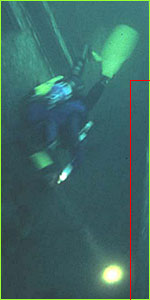


Important information about our past is lost when artifacts are removed improperly from archaeological sites. The physical relationship between artifacts in a site reveals patterns of human use and behavior that no single artifact can. When individual artifacts are removed from their original context valuable information is lost that can never be regained.
Won't natural processes underwater destroy or cover up artifacts, causing them to be lost forever?
Ocean currents and wave action can destroy and cover up underwater sites. One of the primary objectives of the Office of State Archaeology is to create a permanent database of underwater sites so their locations won't be lost. Leaving sites undisturbed is often the most efficient and least costly way to preserve them for the future. It is important to preserve sites so that ongoing improvements in technology and interpretive techniques can be applied to them in the future.
Won't artifacts just rot if I leave them below?
Due to low oxygen levels and cold water temperatures, objects generally decay much more slowly underwater than if they are brought to the surface. Conservation techniques can preserve objects brought up, but they are often time-consuming and very expensive. The safest place for artifacts is often below the surface.
Is it all right to bring artifacts up and donate them to a museum?
It is illegal for museums to accept artifacts collected without a permit. And, by the nature of their business, most museums discourage the removal of individual artifacts when it is at the expense of broader knowledge of our past.
What are the current laws regarding removal of artifacts from underwater sites?
The Federal Abandoned Shipwreck Act provides states with the authority to preserve and protect shipwrecks along their coasts. In 1989, laws were enacted requiring permits for archaeological investigations on State lands. (C.G.S. Sec. 10-386). Since all coastal water, out to the New York/Rhode Island border are under State control, this effectively makes unauthorized removal of artifacts from these underwater locations illegal. If you are interested in researching an underwater site, contact the Office of State Archaeology for guidelines.